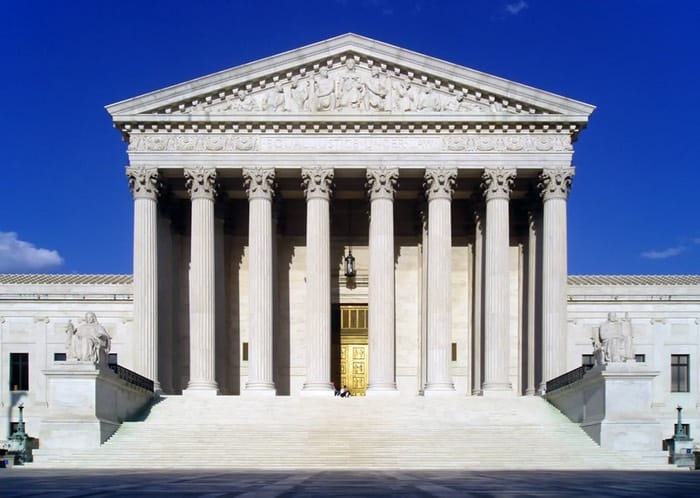
The US Supreme Court on Monday unanimously overturned a decision from the Alabama Supreme Court that denied a lesbian mother parental rights for the children she raised with her ex-wife. The mother who brought the suit had legally adopted the children that her ex-wife gave birth to. However, the Alabama Supreme Court ruled that adoption was not valid.
The unanimous decision was issued early Monday. The short ruling says that the Alabama Supreme Court overstepped its authority by not recognizing the adoption that had been granted in Georgia.
A woman identified in court documents as V.L. sought visitation rights after splitting with her lesbian partner, identified as E.L., who gave birth to three children between 2002 and 2004 when the couple was together.
The ruling issued Monday restores full rights as an adoptive parent to V.L.
“I am overjoyed that the U.S. Supreme Court reversed the Alabama court decision,” the adoptive mother, V.L., said in a prepared statement. “I have been my children's mother in every way for their whole lives. I thought that adopting them meant that we would be able to be together always. When the Alabama court said my adoption was invalid and I wasn't their mother, I didn't think I could go on. The Supreme Court has done what's right for my family.”
NBC News has more background on the case:
Two women, referred to in court documents only by their initials, were in a committed relationship in Alabama for nearly 17 years. One of them, E.L., gave birth to three children. The other, V.L., wanted to adopt them, so on the advice of a lawyer she sought and was granted full parental rights from a court in Georgia, where the laws were considered more favorable to her situation.
Several years later the women split up but could not agree on child custody. V.L. asked an Alabama court to grant joint custody, and it agreed that the Georgia adoption order must be honored.
But the Alabama Supreme Court tossed that order out, concluding that Georgia law barred V.L. from adopting unless E.L., the biological mother, had relinquished her parental rights. The Alabama justices ruled that the Georgia court that awarded adoption rights in the first place misinterpreted Georgia law.
On Monday, in an unsigned opinion, the U.S. Supreme Court said the Georgia ruling must be honored, reversing the Alabama Supreme Court.
As SCOTUS blog explains, an unsigned opinion is one “written for the Court as a whole by an unidentified Justice, is called a per curiam opinion. (In Latin, “per curiam” literally means ‘by the court.')”
Gay rights groups had signed an amicus, or friend of the court, brief on behalf of V.L., arguing that the decision of the Alabama Supreme Court should be tossed out:
“If the full faith and credit clause can be as easily circumvented as it was by the Alabama Supreme Court, the parent-child relationship will be only as strong as the credit it will be given in the most restrictive states,” said a friend-of-court brief filed on behalf of V.L. by several gay rights groups.
“This case is a part of our continuing national conversation about legal respect for the relations formed by and between same-sex couples, including those who raise children.”
Kate Kendell, Executive Director for NCLR (National Center for Lesbian Rights), who represented V.L., said today,
Today's decision–on the heels of our Supreme Court marriage win in June–is a victory not only for our client but for thousands of adopted families throughout the country. […]
Last fall the Alabama State Supreme Court, led by Chief Justice Roy Moore, issued an unprecedented decision refusing to recognize an adoption by a same-sex couple from another state. Today, the U.S. Supreme Court reversed that appalling decision and restored our client's parental rights.
This is what a backlash looks like. But we will never back down. We have justice on our side, and rest assured, we will be there every step of the way to fight for equality and stand up to those who want to turn back the clock. And we will make as many trips to the U.S. Supreme Court as it takes to protect our community.
The decision in the Alabama case is the first LGBT rights case to be decided by the Court since the passing of Justice Antonin Scalia.



